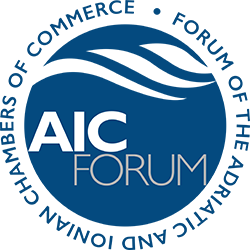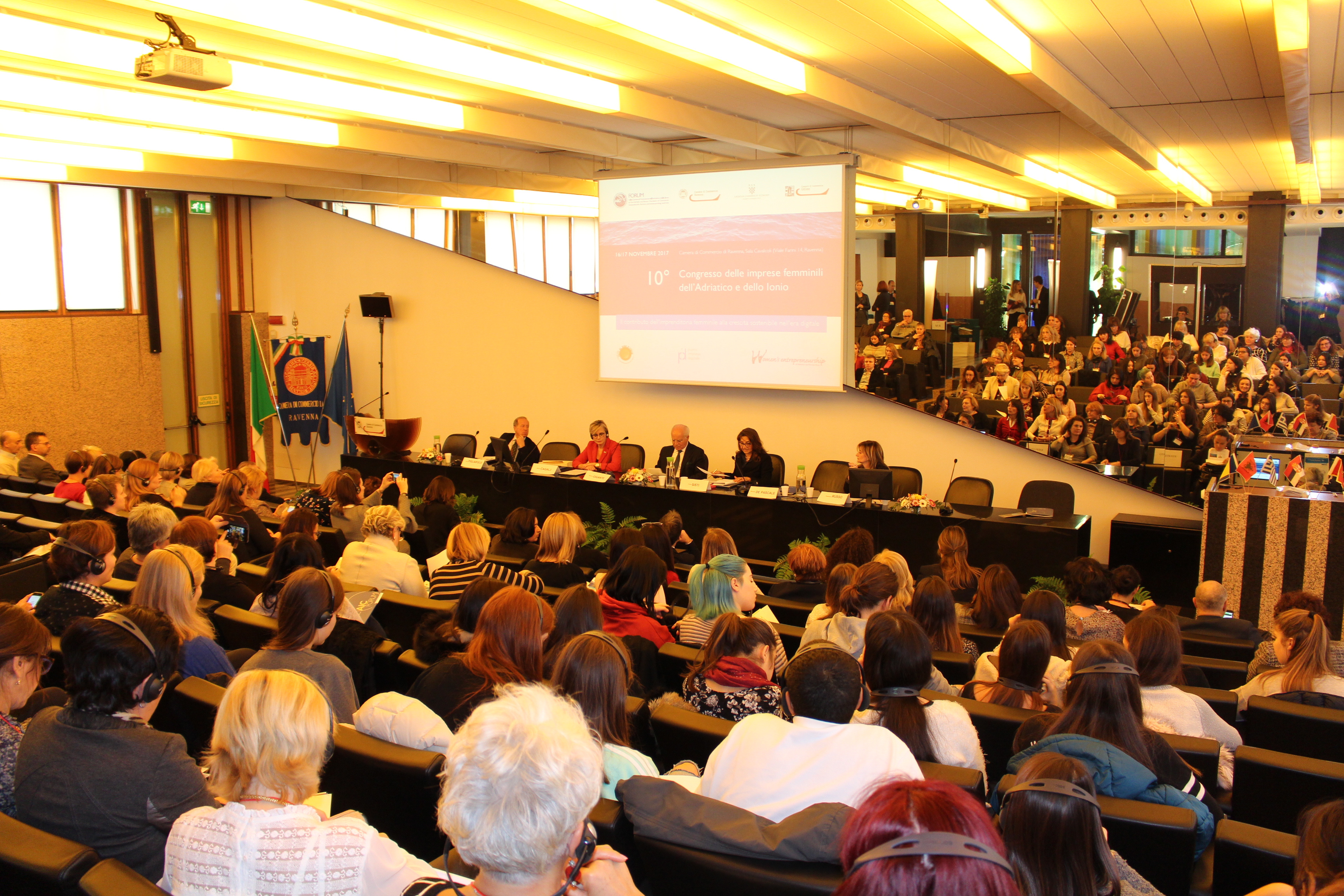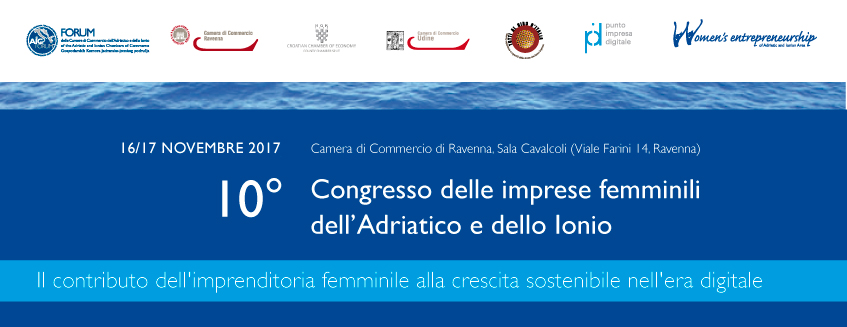
The 10th Congress of Women’s Entrepreneurship of Adriatic and Ionian Area has been held on the 16th-17th of November in the city of Ravenna. The event, jointly organized by the Ravenna Chamber of Commerce and the AIC Forum in collaboration with the Split Chamber of Economy and the Udine Chamber of Commerce, focused on “Women’s entrepreneurship contribution to sustainable growth in the digital era” and saw the participation of more than 150 speakers, entrepreneurs, institutional representatives and stakeholders (all committed to the development of female entrepreneurship) from Italy, Croatia, Bosnia and Herzegovina, Montenegro for a two – days of dialogue and discussion, including two thematic workgroups on digital innovation and tourism.
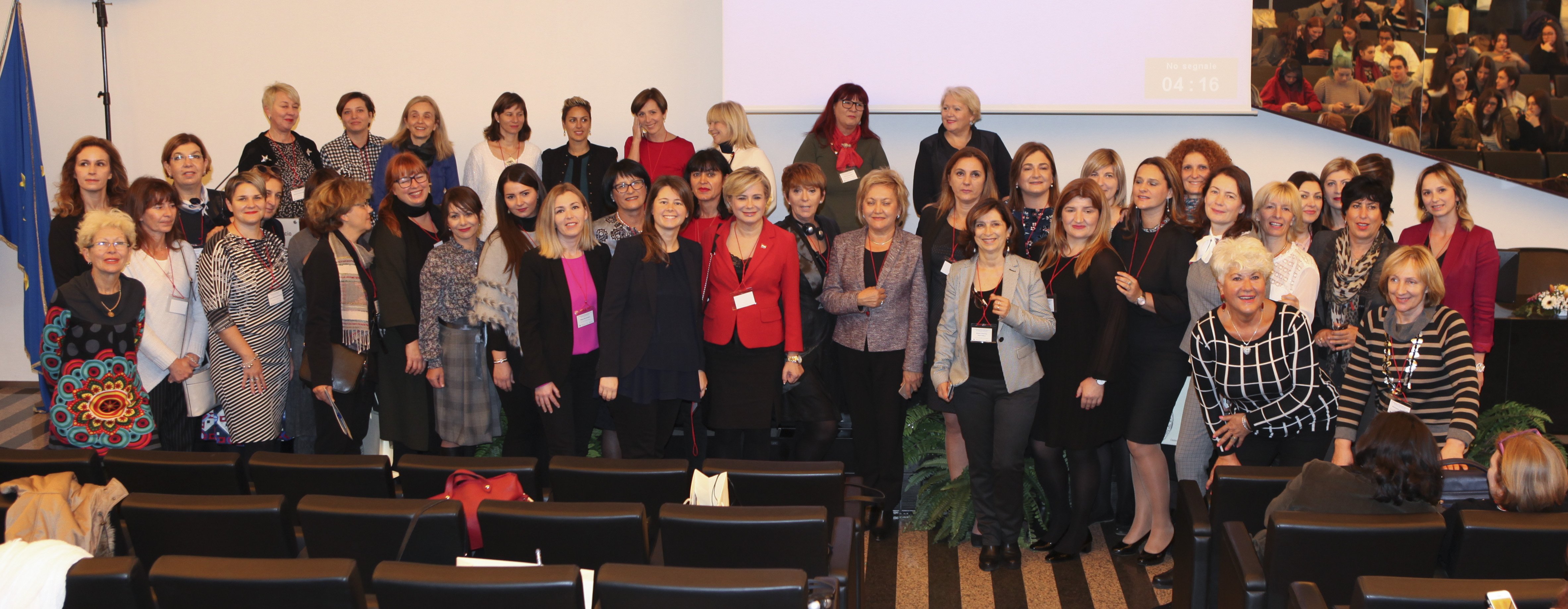
Women’s entrepreneurs of the Adriatic and Ionian Area
This edition focused on the theme of sustainable growth in the digital era, addressing with in-depth analysis from national and international speakers issues related to digitization of businesses and the role of the Chamber system in supporting SMEs, especially women’s. Interesting ideas emerged regarding the innovative aspects of female entrepreneurship, industry 4.0, digital innovation programs, funding opportunities, and supporting institutions for women’s growth in the economy.
The event was also part of the Giro d’Italia delle Imprese femminili organized by Unioncamere within the Network of the Committees for Women’s Enterprises
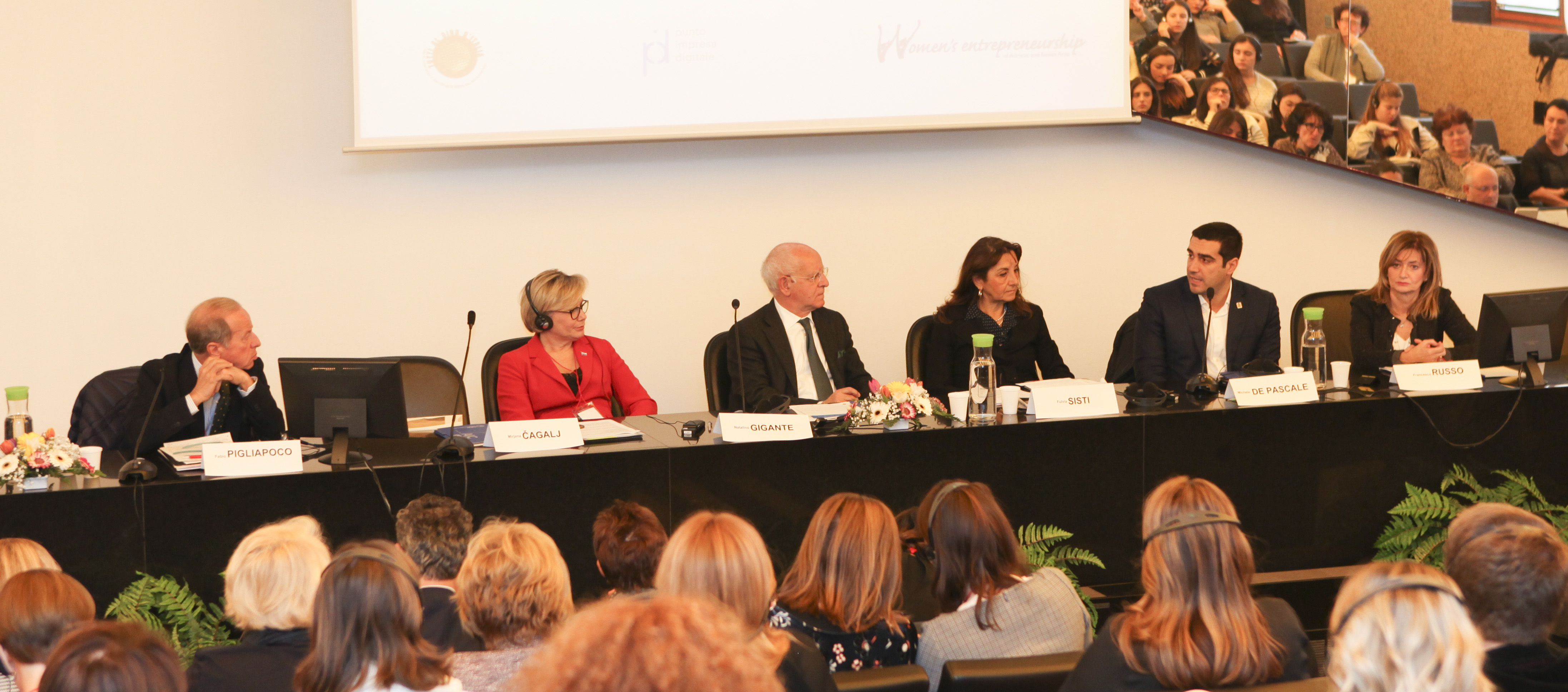
Institutional welcoming greetings
Moderating the debate, Fulvia Sisti, RAI journalist. The plenary session opened with greetings of the President of the Ravenna Chamber of Commerce, Natalino Gigante, who stressed the importance of the event: “An event that grows year after year, not only in terms of participation but also in content and results, and it has become a point of reference for both institutional and entrepreneurial comparisons within this geographical area”.
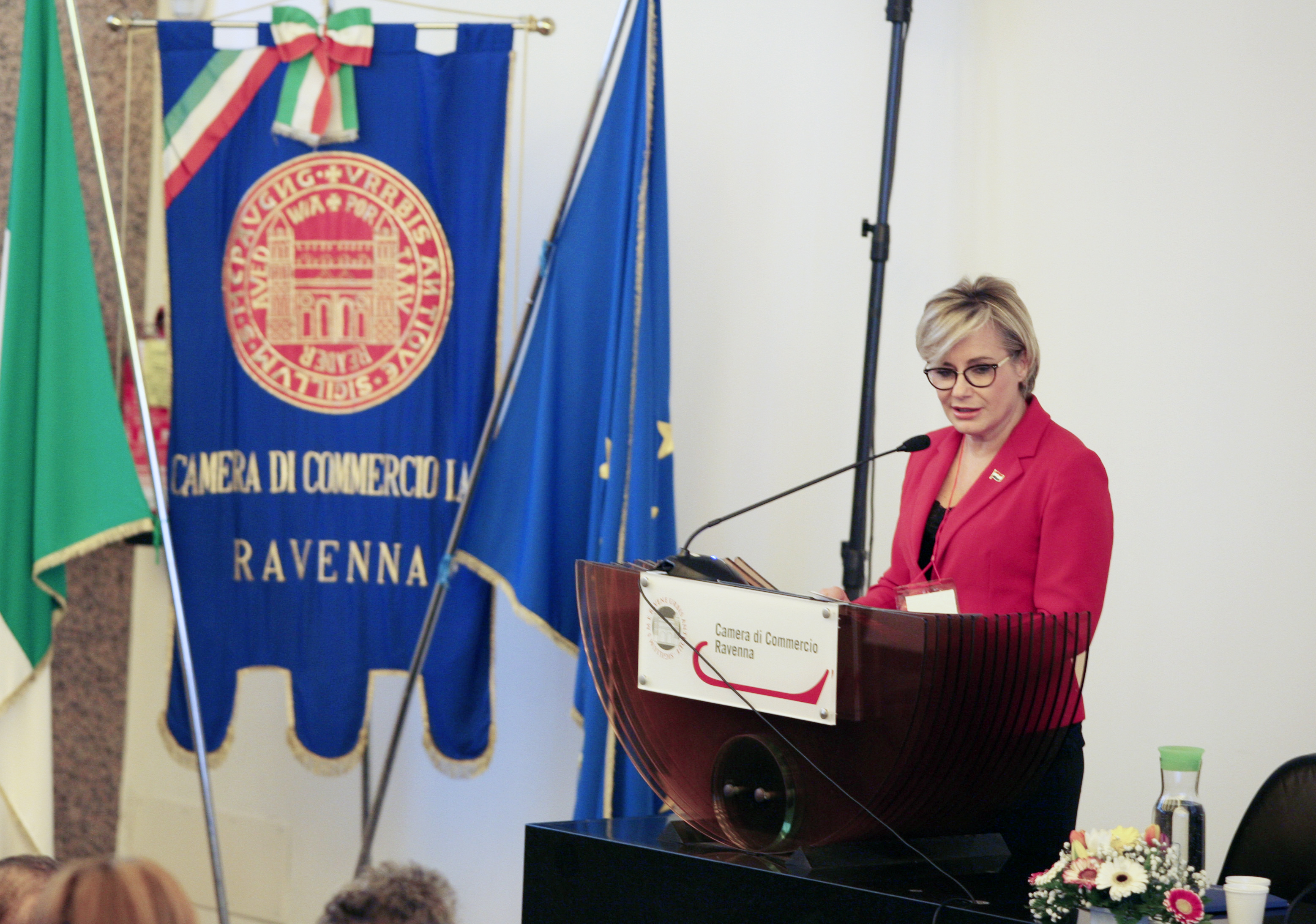
Mirjana Cagalj, President Forum AIC
The President of the Forum of the Adriatic and Ionian Chambers of Commerce Mirjiana Čagalj took the floor, highlighting the importance of the AIC Forum as a stakeholder of the EUSAIR strategy and the work that has been done over the years by the Women’s Entrepreneurship Workgroup. Addressing the issues that are central to this year’s edition – digitalization, adaptation and transformation of businesses in the digital era – is a duty, given the large number of businesses in the Adriatic-Ionian area, to be pursued to keep up with modern times. Michele de Pascale, mayor of the City of Ravenna, emphasized the differences and inequality still existing between men and women given the same level of results. Therefore, events like this one gain importance that add value to the significant contribution of female entrepreneurship to market and society. The Deputy Prefect Vicar of Ravenna, Francesca Montesi, then mentioned the G7 of Equal Opportunities, which took place in Taormina a few days before the WE Congress, and which commits member States to meet targets and deadlines for an economic environment that is sensitive to the gender dimension. The opening greetings were closed by Amb. Fabio Pigliapoco, Senior Adviser to the Permanent Secretariat of the Adriatic Ionian Initiative, who reaffirmed the importance of civil society, of the AIC Forum (together with the Forum of the Cities and Uniadrion) and emphasized that the macro-regional strategy is based on the principle of subsidiarity, thus linking the European dimension to local territories. The AIC Forum remains a key player to the Strategy today. This bottom-up approach, which starts and develops form the civil society, is still lacking, and invites the same civil society to participate through roundtables and governments to take greater account of them.
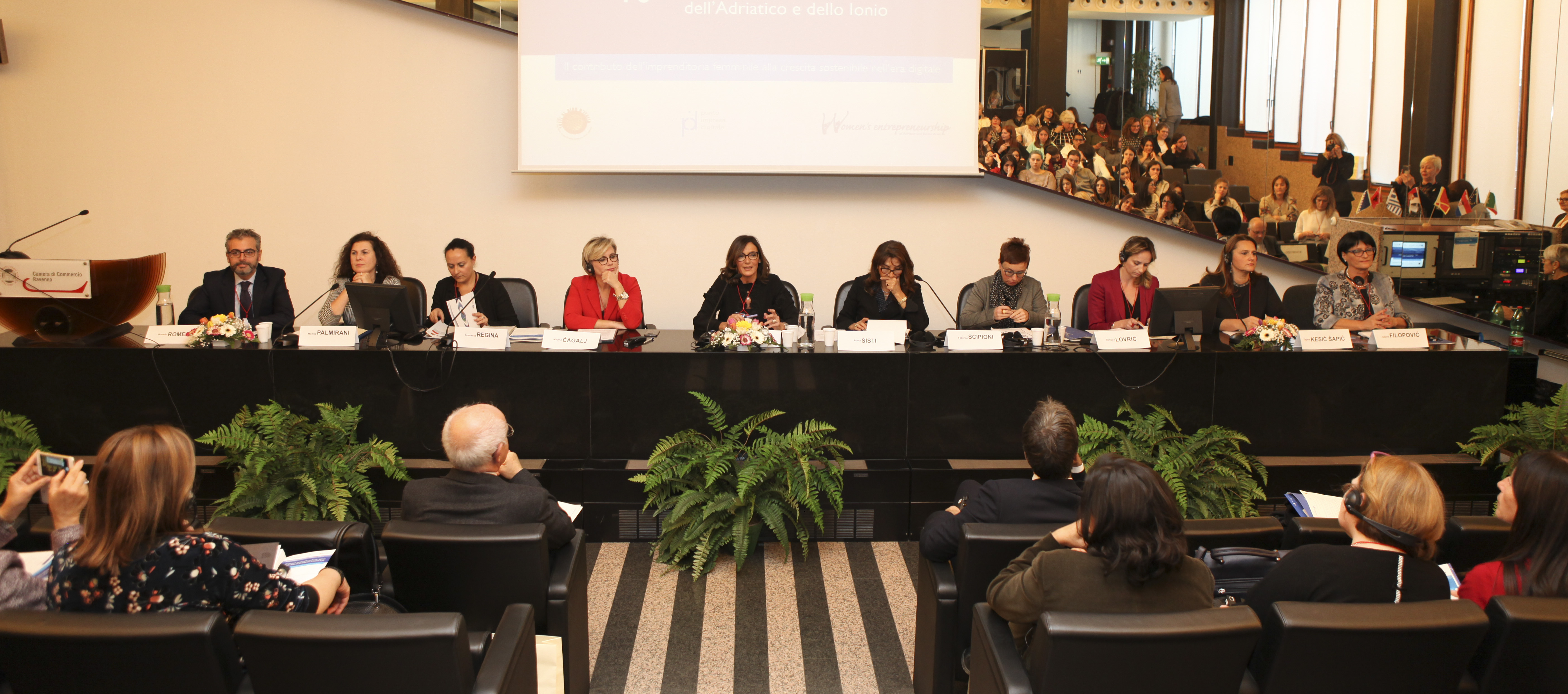
Pleanary session: Antonio Romeo, Monica Palmirani, Mirjana Cagalj, Tiziana Pompei, Federica Scipioni, Danijela Lovrić, Tajana Kesić Šapić, Ljiljana Filipović
The first part of the plenary session “Industry 4.0 and digitalization: the role of Chambers of Commerce in assisting SMEs” was opened by Tiziana Pompei, Deputy Secretary General of Unioncamere, who presented an analysis on Female Entrepreneurship in Italy, focusing on digitalization as the asset of the future and on the importance of the Chambers of Commerce Committee for Women’s Enterprises. Mirjana Čagalj, acting as Vice-President of the Croatian Chamber of Economy, after reiterating the importance of women in the top management roles, offered participants a general overview of the numbers of women’s businesses in Croatia. Before 2010, the number of WEs was below 10%; since 2014, incentives have been provided which have enabled to increase the number of female entrepreneurs, thanks to banks and the government, thus influencing the share of women’s own holding companies. Most of the women-owned businesses in Croatia is concentrated in the health sector, education and training; still lacking however, it is the share of women in ICT and in the production sector.
Francesca Regina, Deputy Secretary General of the Italian Chamber of Commerce for Germany, who works to promote and implement cooperation between enterprises in both countries, illustrated the experiences of the 4.0 industry in Germany as best practice, in particular government measures in favour of SMEs and the state of art of industry 4.0 in Germany. Regarding concrete Italian measures, Antonio Romeo, National Project Coordinator “Punto Impresa Digitale”, intervened on the work of the Chambers of Commerce on digitization and the services they provide to Italian companies, which, unlike Germany, are mostly medium and small. Training courses have been organized to increase the skills of Chamber of Commerce officials and modernize digital activities. Romeo then presented to participants the 4 macro-typologies of services provided by the Chambers to businesses with regard to digitization: support to business technology investments; information and training services for (M)SMEs; assessment of digital maturity; and digitization (digital promoter and digital mentor). Danijela Lovrić, as representative of the Chamber of Commerce of the Federation of Bosnia and Herzegovina, intervened on the situation of female entrepreneurship in the context of the Federation. In her speech, it has been pointed out that at the moment there is no strategy for female entrepreneurship at national level, leading to a backward level in this field compared to other Balkan countries. The only document where female entrepreneurship is mentioned is the “Gender Action Plan” but only as an integral part of the SME Development Strategy. To date, more training (especially ICT) is needed together with greater exchanges of experience with other countries. Ljiljana Filipović, Vice President of the Montenegro Chamber of Economy, analyzed the situation of women’s businesses in Montenegro. Although the situation is similar to other countries in the Balkan region, the figures show a result below the European average, denoting a male prevalence in business management. On the other side, it is very positive the realization of a 2015-20 Women’s Business Strategy and how the number of women acquiring digital skills (STEM) is constantly growing. The Montenegro Chamber of Economy, in this regard, provides women’s businesses with: mentoring and coaching; financial assistance and economic incentives; networking opportunities. Later, Professor Monica Palmirani of the University of Bologna took the floor with a speech on ” Digital culture to foster female entrepreneurship”, stressing the need to strengthen not only technological skills but to focus on digital culture. The European Union in this framework has implemented a platform – Digital Single Market – where businesses can find a fertile ground in this regard. Tajana Kesić Šapić, Director of the Department of Industry and IT of the Croatian Chamber of Economy, spoke about the “Digital Chambers Project in Croatia”. The Croatian Chamber of Economy has organized several training activities (including conferences, courses, workshops and seminars) involving more than 25,000 people, of which over 50% were women. In addition, the Split Chamber founded an incubator to provide the necessary support for start-ups. This is part of the largest National Strategy for the Development of Women’s Business 2014-20 and the National Strategy for Gender Equality. At the end of the morning plenary session, Federica Scipioni of Unioncamere intervened and explained the European Business Register Interconnection System (BRIS). Since June 2017, the European Union has made available this platform where business registers (of the member countries) are interconnected, allowing to search for information on companies registered in any EU country and to share information on branches and cross-border activities.
The second part of the plenary session was devoted to the exchange of experiences and best practices between Italian Committees for women’s entrepreneurship and women’s organizations of the Adriatic and Ionian Area.
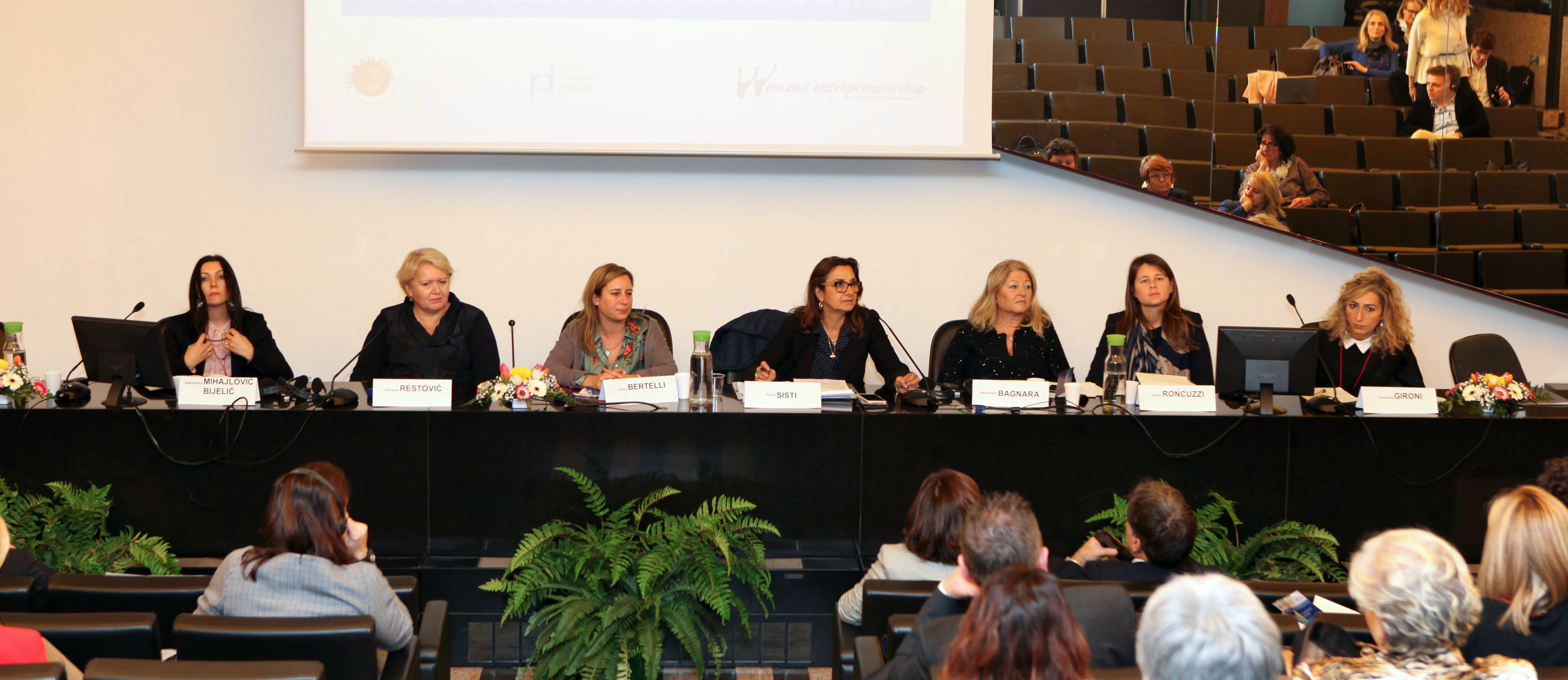
Exchange of experiences: Aleksandra Mihajlović Bijelić, Gordana Restović, Chiara Bertelli, Alessandra Bagnara, Chiara Roncuzzi, Francesca Gironi.
The first to intervene was Chiara Roncuzzi, President of the Ravenna Committee for Women’s Enterprises, who presented a series of activities and seminars on entrepreneurship, e.g. “Women are the protagonists of economic change” and “Women, work and organizational rules”. Subsequently took the floor Alessandra Bagnara, President of “Linea Rosa” Association, centre for violence against women. The President stressed the economic independence of women as one of the first important steps to get out of violent situations and provided a series of tools and opportunities that women can seize to reduce violence. In this respect, an interactive protocol was launched, with the support of CIF Ravenna, and which have actively involved companies, violence centres and trade unions by combining the needs and necessities of women in distress through concrete responses: internships, training courses , etc. Gordana Restović, President of the Croatian Association of Business Women ”Krug”, focused on the situation of female entrepreneurship in Croatia in this new digital era, that, on the one hand opens up many opportunities for women entrepreneurs while on the other also highlights the shortcomings that there are in this field. Even today, the number of women in STEM fields and more general in IT (fields) remains low, with a percentage that is around 10-20%. It should be increased the supply so that more and more women can be included in these sectors. The President of the Ancona Committee for Women’s Enterprises (CIF), Francesca Gironi, has first made a brief reflection on the evolution of the Marche region CIF in view of the Chamber of Commerce merging. The activities that has been brought forward in recent years are facilitating access to credit, and more generally credit and training support. Other activities are the work with higher education institutions (high schools); networking between women’s businesses; the composition of social networks between women’s businesses, new businesses and female start-ups; and partnerships. The Ancona CIF President then focused on two initiatives, as best practices to share with the audience. The “Women’s Business Network” (“Network donne d’impresa”) project promoted by the Regional Equal Opportunities Commission in collaboration with the Committees for Women’s Enterprises, aimed at creating a network of Marche female entrepreneurs through an on-line platform and the creation of training and innovative tools, both in classroom and in distance learning (e-learning). The Call for proposals “Bando Impronta d’impresa” that dispense money prizes to innovative female entrepreneurs in the area. The Committee rewards businesses that distinguished themselves for developing innovative business projects in the following categories: Sustainability Award for the most innovative women enterprise in terms of environmental sustainability and / or social responsibility; and the “Tourism and Culture” Award for the most innovative women enterprises that can make a significant contribution to the development and promotion of tourism and / or the enhancement of the material and immaterial cultural heritage of the territory. Aleksandra Mihajlović Bijelić, Secretary General of the Women’s Business Association of the Republika Srpska, highlighted the positive steps taken in the Srpska Federation to foster the development of female businesses: for the first time in this sector it has been defined a regulatory framework for WE funding and incentives, training, promotion and support; a strategy that will be shortly adopted, thanks also to the contribution provided by the Committee for Women’s Enterprises of the Srpska regional chamber, based in Banja Luka. The Committee also offers support to women entrepreneurs; proposing changes to existing legislation through lobbying; networking, attendance at fairs, congresses, training and generally promotion of this sector. The most important activities are the drafting of the framework law, which is being adopted, the organization of seminars and training courses; support programs and incentives; and facilitate access to some credit networks. At the end of the second plenary session, Chiara Bertelli of the Ferrara Committee for Women’s Enterprises intervened by presenting Ferrara CIF initiatives to support women’s businesses, such as: training seminars on the various aspects of business management and development, prizes to top female entrepreneurs who hire and promote life-time reconciliation and working times, and call for proposals contributing to female entrepreneurs investing, developing and contributing to making the territory more competitive.
After the end of the afternoon plenary session, participants took part in the “Mosaic route between tradition and innovation”, which included visits to the AnnaFietta.it mosaic workshop, to the exhibition “SICIS – micromosaic destination, immersive multimedia experience ” and to the guided tour of the Byzantine mosaics of San Vitale and Galla Placidia, organized by the Ravenna Chamber of Commerce.
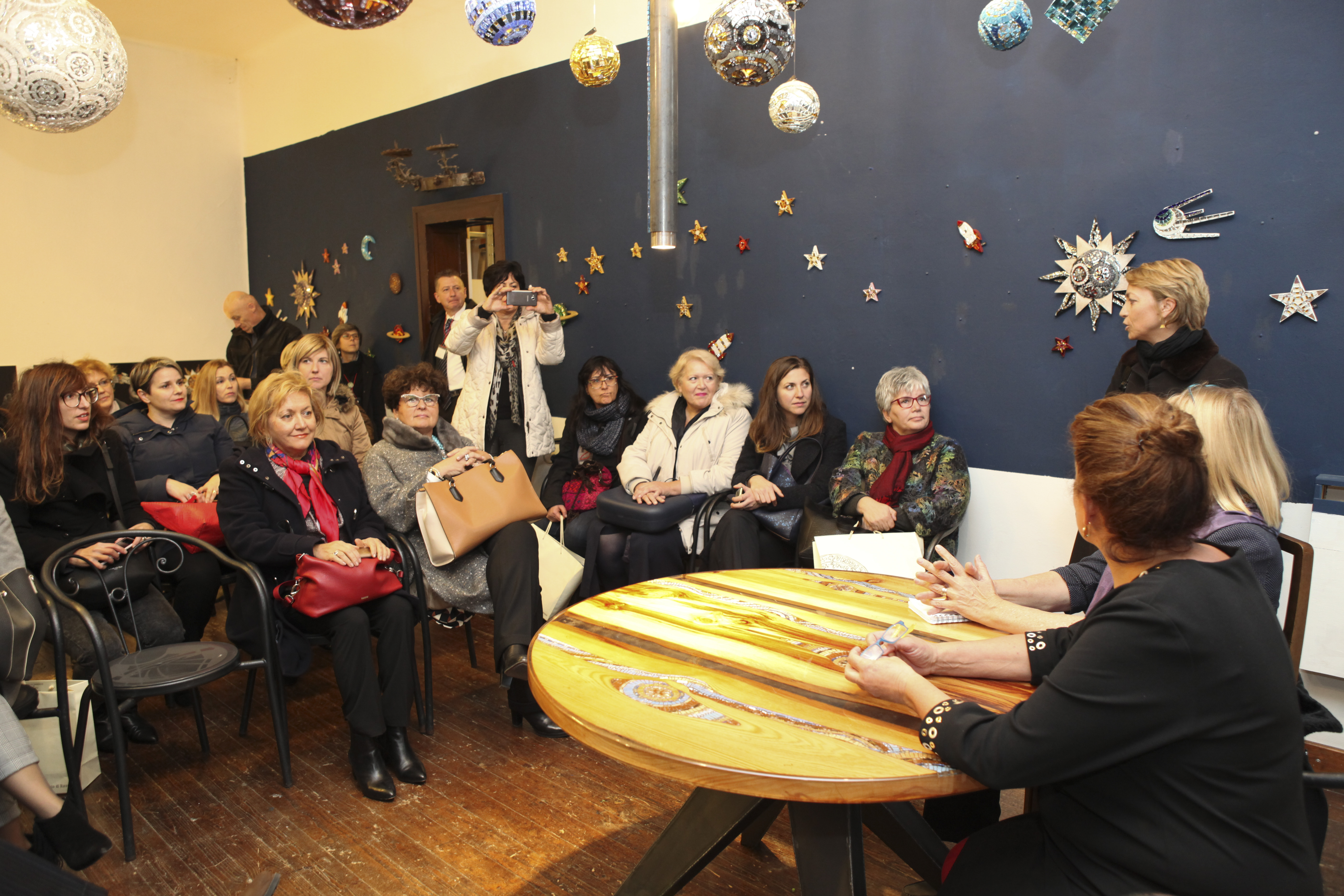
Visit to the mosaic lab AnnaFietta.it

Visit to the exhibition “SICIS – Micromosaic Destination, immersive multimedia experience”
On November 17th, two Thematic workgroups were organized: I) Sustainable tourism, agri-food and II) Innovation and New Technologies.
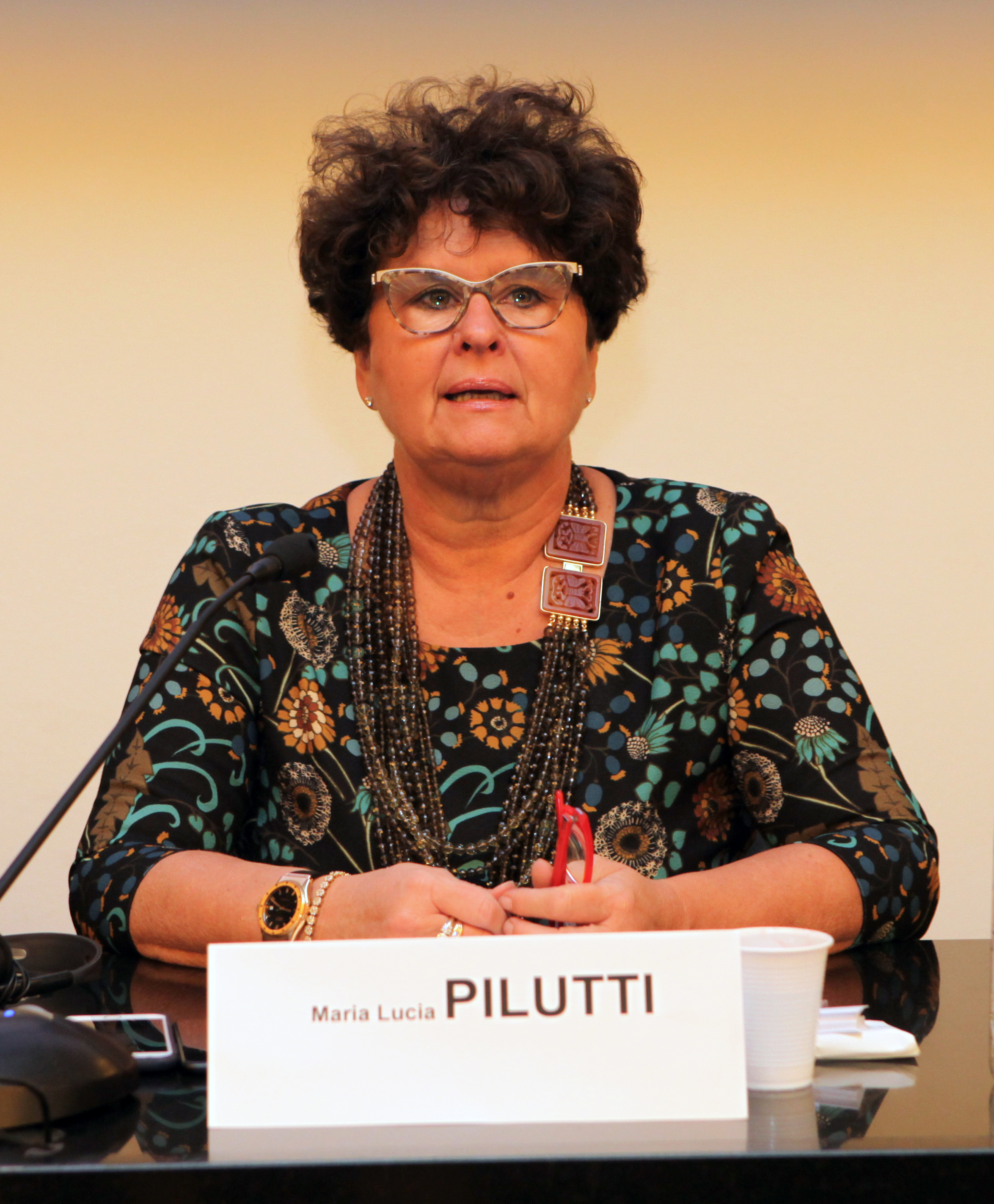
Maria Lucia Pilutti, Secretary-general Udine Chamber
The Workgroup on Tourism, coordinated by the Secretary General of the Udine Chamber of Commerce, Maria Lucia Pilutti, as Coordinator of the AIC Forum Working Group on Women Entrepreneurship. As key speaker, Lidia Marongiu, CEO of Happy Minds srl, communication and tourism marketing expert, explained the concepts of sustainable and experiential tourism, giving participants practical, concrete and innovative examples such as “Get Your Liguria experience”, an experience in the form of a game designed for the promotion of the Ligurian territory and for the construction of tourist itineraries developed by Happy Minds. Moreover, the concept of Big Data applied to the tourism industry have been illustrated to give an idea to the participants of real-time tourism planning (ex. Barcellona, Spain). To follow, several speakers who brought their experiences and best practices took the floor.
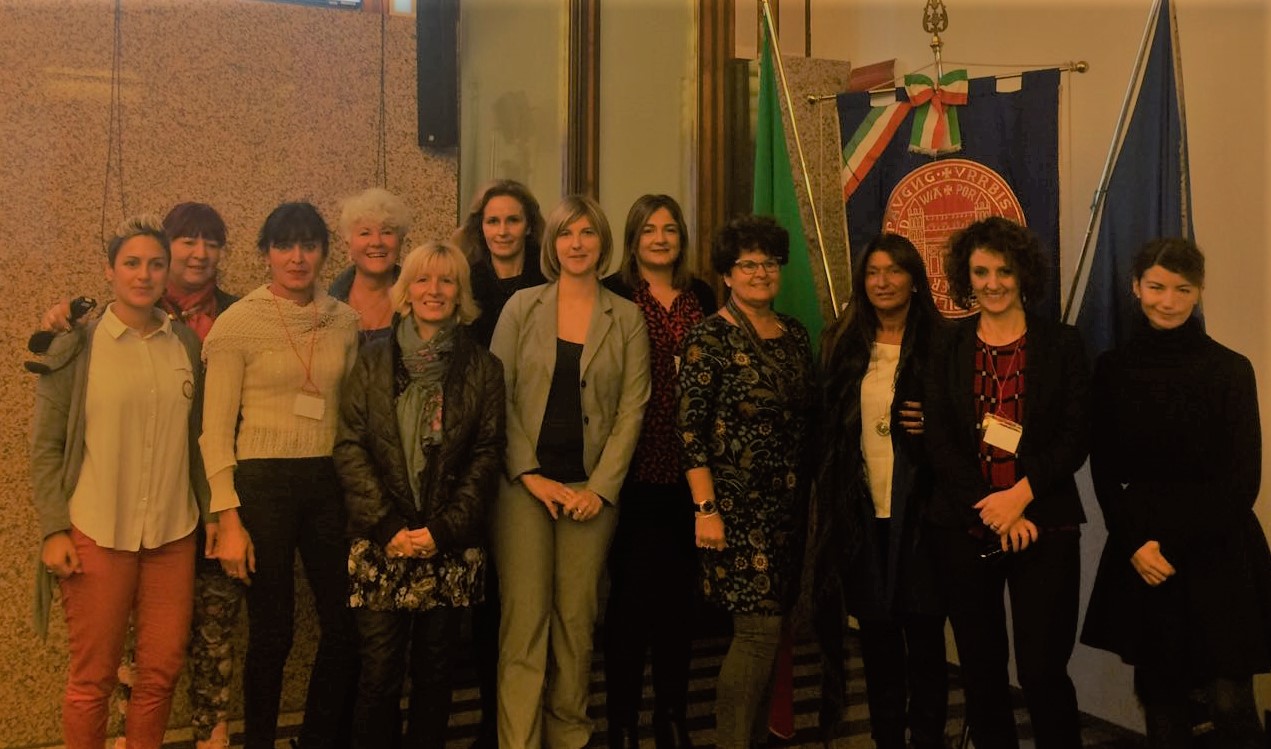
Women’s entrepreneurs – Tourism workgroup
Cristina Lambiase, Activity Liaison Officer at the ENIT Observatory in Beijing, with a focus on the Chinese market in view of EU-China Tourism Year 2018 (ECTY), illustrating the major trends in Chinese tourism, European data and innovative Chinese tools used in this field. Katarina Peršurić Bernobić, Pjenušci Peršurić D.O.O. Director, an Istrian wine company who promotes high-quality local products and combines tourism with the promotion of the territory through its products. Monica Ciarapica, owner of the Hotel Commodore in Cervia, who described his experience in the field of tourism, the evolution of this sector over the years and how she adapted to remain competitive on the market. Emma Taveri, CEO of Destination Makers, which provides strategic and operational support to develop community tourism, sustainable travel experiences and social impact projects in niche and less developed destinations. Karmen Jelcić, Director of the Croatian Intellectual Capital Center, which promotes the concepts of smart economy, knowledge economy, and presented some of the Croatian realities involved in this context through entrepreneurs coming in person to tell their experience.
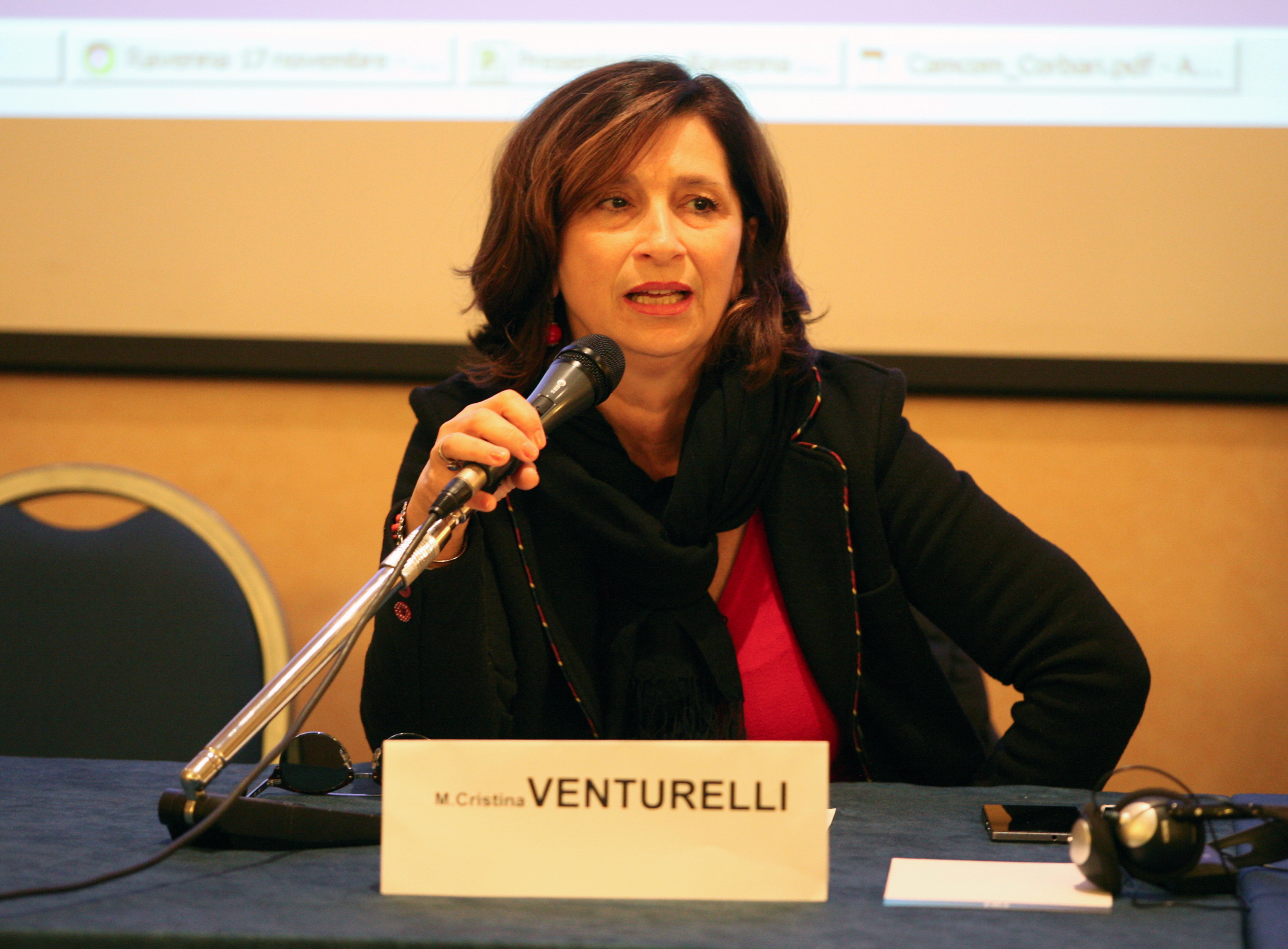
Maria Cristina Venturelli, Secretary-general Ravenna Chamber
The Workgroup on Innovation and New Technologies, coordinated by Maria Cristina Venturelli, Secretary General of the Ravenna Chamber of Commerce, saw the presence of Cecilia Pedroni of Happy Minds srl, digital communication consultant, who explained to entrepreneurs the importance for businesses of new technologies through the new (differentiated but universal) languages and the new trends that allow to build a direct relationship with users / customers by launching localized messages on micro-targets that point to experience to live (and not just to tell) through the products offered. Later, Venera Acagnino, representing Infocamere, illustrated the innovative business digitization services that simplify relations with the public administration and easily provide official information and official documents, tools such as digital books for the computerization process of book keeping and accounting records. Time for best practices. Entrepreneur Angela Corbari, co-founder of Studiomapp, presented the innovative startup that specializes in advanced ICT for quality of life through innovation. Using Artificial Intelligence applied to Geo-Calculation and geospatial data, and start up, provides solutions for Smart Cities, Mobility, Transport and Logistics, Tourism and Cultural Heritage, Real Estate, Agriculture, Territory and Natural, Health and Social Resources Management. They specialize in Territorial Information Systems, Satellite Data Analysis, Open Data, Software Analysis and Development.
Francesca Gironi, the President of the Ancona Committee for Women’s Enterprises (CIF), introduced the supporting services and the initiatives oriented to the enterprises of the territory with particular attention to women’s enterprises to which the call for proposals “Bando Impronta d’impresa” – that dispense money prizes to innovative female entrepreneurs in the area – is devoted to. One of the beneficiary of the last-year calli is Silvia Viganò, owner of Madamadorè, artisan embroidery and much-prized material knitwear shop. Madamadorè is a best practice thanks to its ability to evolve through the realization of video tutorial of knitting and crochet on YouTube Channel. Silvia Viganò is testimonial to what a company can do thanks to the support of Italian Chambers of Commerce: take part in free courses for entrepreneurs and aspirants, host young digitalizers and open up to the web thanks to them, apply for a competition reserved for innovative women entrepreneurs and win it.
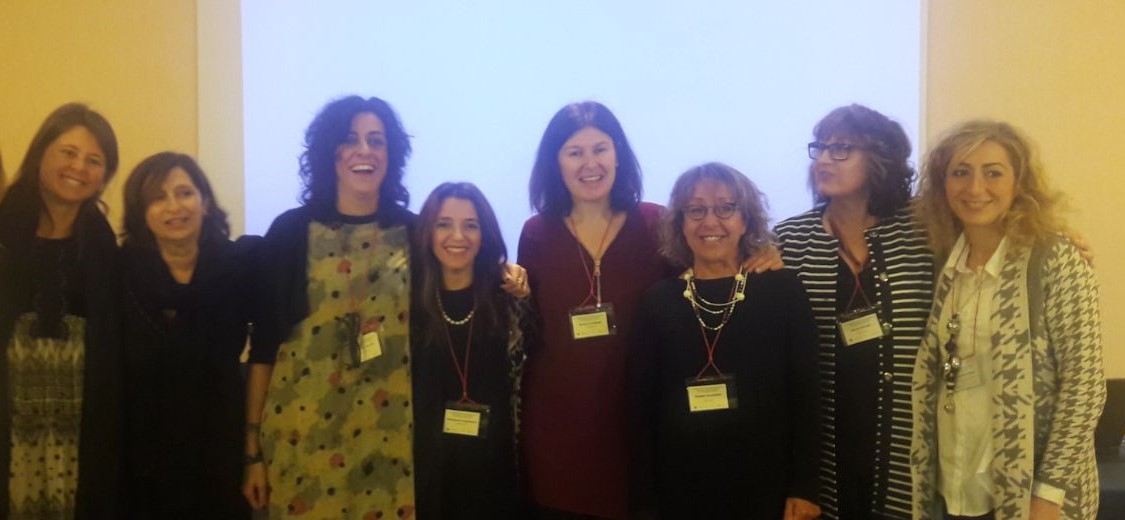
Women’s entrepreneurs – Innovative workgroup
Another company that has been able to capture all market changes was undoubtedly the one owned by Marianna Panebarco: Pane barco’s Barco & c. Through an original presentation, she told the story of her family and their business: from her father’s passion for comics, the company has been able to turn its products first into the digital cartoon, following the 3d, until now that it offers packets of personalized communication to businesses through animations, stories, videos, and more. Maria Livia Rizzo‘s speech closed the works of the Innovative and new technologies workgroup. Lawyer and professor at the University of Bologna, Mrs Rizzo presented data on a employment for young women (between 15 and 39) in the creative industry – which corresponds to 47% – and the potential that can be developed in this area by explaining all the intellectual property rights protection tools to prevent the ideas from being copied and exploited economically.
The two-days ended with the visit organized by the Ravenna Chamber of Commerce at the Trerè di Faenza Wine Company, which after the presentation of the own products (from vineyards to production) greeted the entrepreneurs with a good tasting in the suggestive location of the Romagna territory.
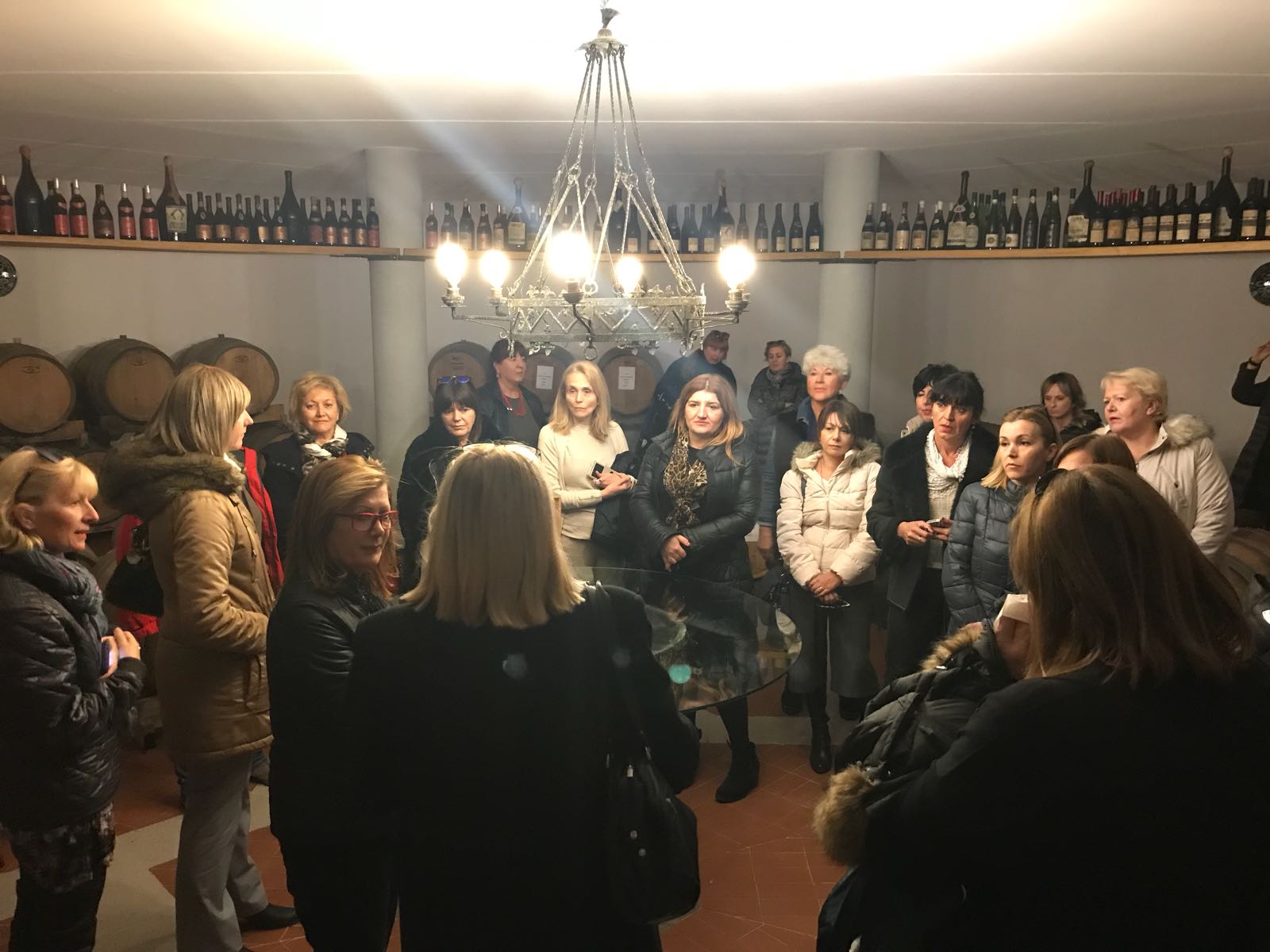
visit to “Trerè” wine company in Faenza
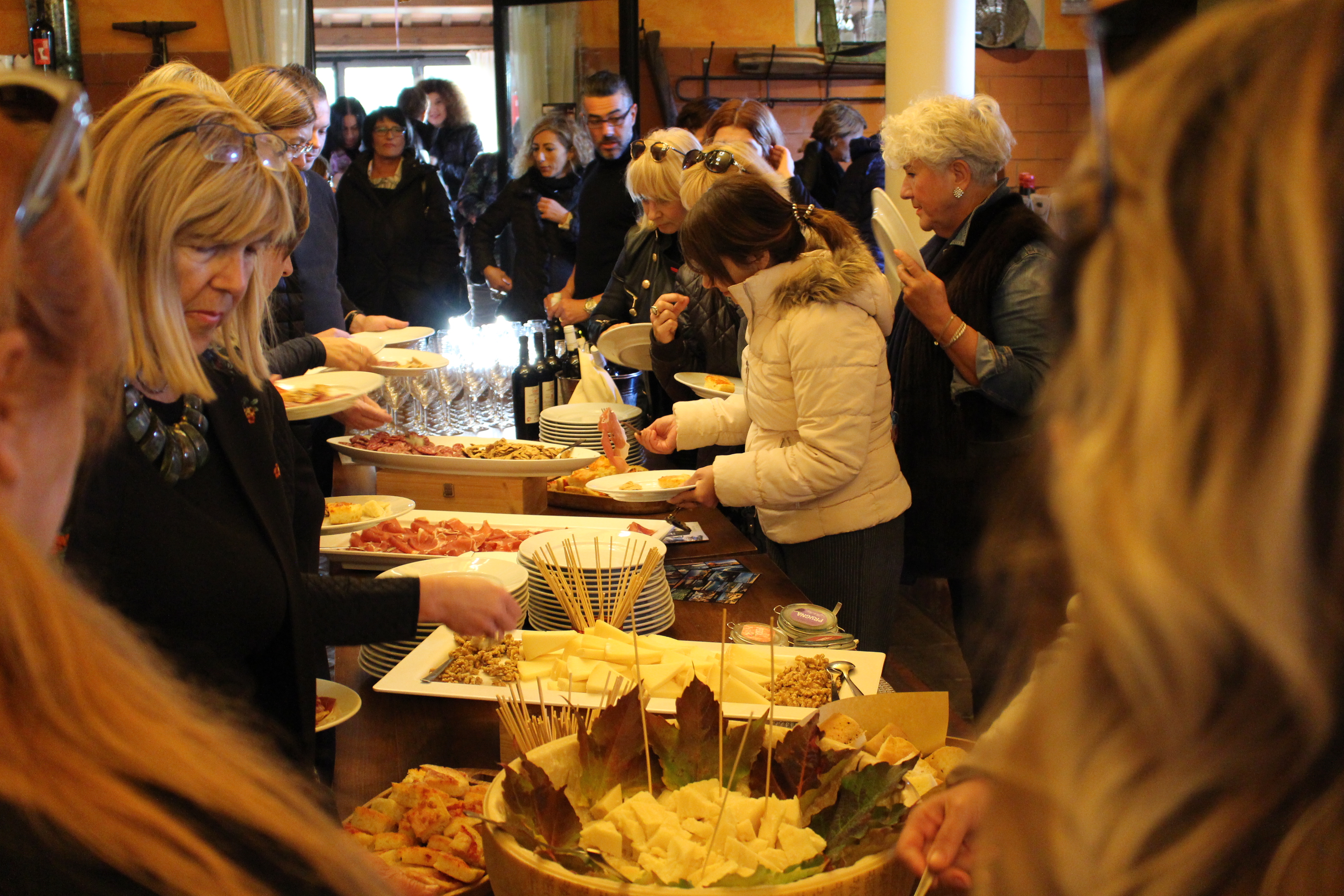
Tasting of local products in “Trerè” wine company
Presentations
Plenary Session:
Danijela Lovric, Camera di Commercio della Federazioni di Bosnia ed Erzegovina, “Analisi del contesto in Bosnia ed Erzegovina”
Tajana Kesić Šapić, Direttore del dipartimento Industria e IT della Camera dell’Economia Croata, “Progetto delle Camere digitali in Croazia”
Federica Scipioni, Unioncamere, “La piattaforma d’interconnessione dei registri europei BRIS-Business Register Interconnection System”
1st Thematic workgroup: Sustainable tourism, agri-food
Claudia Lambiase, Expert, Activity Liaison Officer at the Osservatorio ENIT in Beijing, “Focus on
Chinese Market in the view of EU-China Tourism Year 2018 (ECTY)”
Katarina Peršurić Bernobić, Direttore, Pjenušci Peršurić D.O.O.
Emma Taveri, Amministratore Delegato, Destination Makers
2nd Thematic workgroup : Innovation and new technologies
Cecilia Pedroni, Happy Minds srl, Digital Communication Consultant
Angela Corbari, Studiomapp start up innovativa
Marianna Panebarco, General Manager Pane barco & C.
